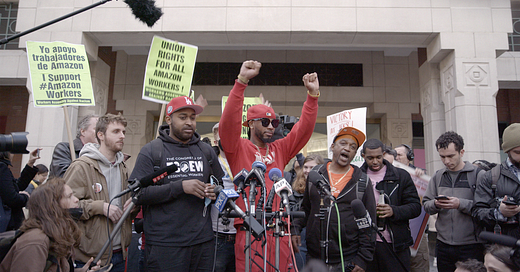The launch is Monday, June 23 at 10pm on PBS Television. It will then be available to stream until August 31, 2025 at pbs.org, and the PBS App.
Describe the film for us in your own words.
Union is a film about a group of ordinary workers learning in real time to become labor organizers. It intimately follows workers at an Amazon fulfillment facility in New York as they undergo an unlikely unionization campaign against all odds. It’s a film about how people become political within communities of struggle, about how the cleavages of race, class and gender play out in everyday life, and about what organizing means in a world of extraordinary inequality.
What drew you to this story?
After 50 years of organized labor being in decline across the world, it was exciting to see a new generation of labor organizers independently forge a new path within a resurgent labor movement. I am always drawn to stories about how, politically and socially, ordinary people grapple with power and with the continued effort to have collective power. In the ALU (Amazon Labor Union) we saw a really beautiful, multi-racial movement of workers showing care for each other and helping each other understand their own value in the workplace, and we wanted to bear witness to that.
What do you want people to think about?
I want people to think about how global capitalism has dealt the majority of us a raw deal, and yet continues to tell us that there’s no way out. I want people to think about a world where the wealth isn’t concentrated in the hands of a few billionaires, where low-wage workers aren’t the first to die during a global pandemic, and where people feel like they have actual power in the workplace. That world is possible.
What was the biggest challenge in making this?
Knowing when to stop filming! Fascinating things are still happening within the Amazon Labor Union, and we could have made two films, or a series. It took real discipline on our part to know when to stop!
What was the development process? How did you get green lit?
We were very lucky, as independent filmmakers, in that we did what many independent productions did when starting a film - we wrote a lot of grant applications. But in our case, these applications were often successful and we got early support from amazing granting institutions like Chicken and Egg, Ford Foundation, Field of Vision, Sundance, the IDA, Catapult…. Impact Producers (socially minded equity investors) also came on relatively early, on the strength of the project and their confidence in us as filmmaker, which is especially meaningful as we couldn’t promise anyone that the film would have a happy ending (ie. we didn’t know whether the ALU would even get to an election, let alone win that election). This kind of early support for a verite film is hard to come by, and doesn’t always happen, even when the film is strong and should be made. We worked very hard during the development phase and also were very lucky.
What inspired you to become a storyteller?
I don’t know that I see myself as a storyteller so much as an artist and a critic. I make film out of a desire to ask hard questions about the world and to use the alluring, mysterious, tender and complex language of cinema to seek answers to those questions in a form that is felt and experienced, rather than merely consumed. I come to cinema through a love of painting, music and literature… film is for inherently multi-layered and brings together the power of text, sound, and image in ways that make it feel possible to probe the hardest and quietest of subjects.
What’s the best and worst advice you've received?
"Just make a film a film on your iPhone and put it on YouTube."
No! filmmaking is an art, and like any art, it’s valid to care about craft, collaboration, getting paid for our labor, and using our creative tools and instruments well. Youtube does not solve our distribution problems. And collective watching in theatres is sacred.
What advice do you have for other female creatives?
Don’t let yourself get gaslit. Sexism continues to be endemic to our industry, but it’s often coded in ways that can make us feel crazy when we try and point them out. Trust your instincts and seek out people to work with that are committed to challenging gendered dynamics in film. Don’t put up with it - you don’t have to. And also don’t feel like the mark of good filmmaking is one’s willingness to put a project above all other human responsibilities - I’ve found that this is one of most pernicious ways in which sexism continues to play out. The care work of taking care of children, sick loved ones, and elderly parents often falls on women and trans folks the most, and yet the industry tells in all sorts of ways that filmmaking is incompatible with also upholding those responsibilities. That’s bullshit! Taking care of ourselves and our loved ones is not not only compatible with creative practice and professional ambition, but it makes our creative practices better. Insist on this in every role you take.
Name your favorite woman directed film and why.
There are so many. But I love Sambizanga by Sarah Maldorar and O’er the Land by Deborah Stratman (just as a starting place!)



